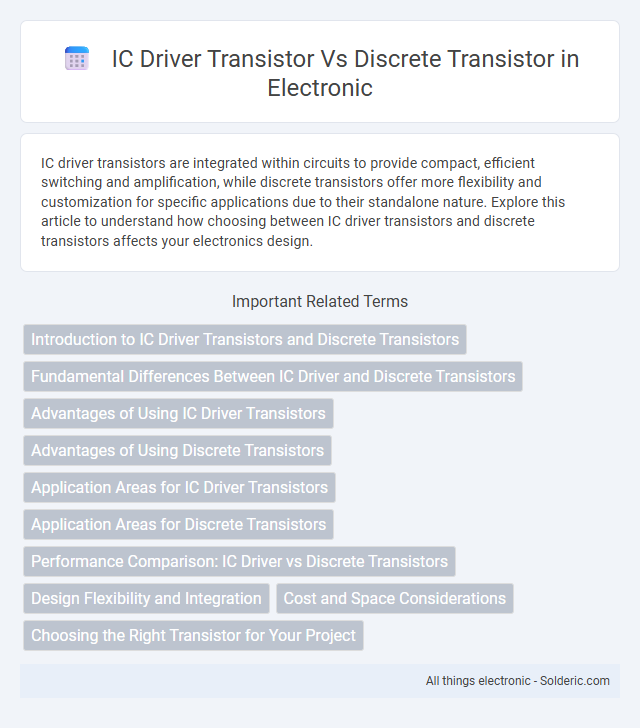IC driver transistors are integrated within circuits to provide compact, efficient switching and amplification, while discrete transistors offer more flexibility and customization for specific applications due to their standalone nature. Explore this article to understand how choosing between IC driver transistors and discrete transistors affects your electronics design.
Comparison Table
| Feature | IC Driver Transistor | Discrete Transistor |
|---|---|---|
| Integration | Integrated within ICs | Standalone component |
| Size | Compact, miniaturized | Larger physical package |
| Performance | Optimized for specific IC functions | Wide range of electrical ratings |
| Power Handling | Limited by IC design | Can handle higher power levels |
| Cost | Lower cost per transistor in volume | Higher cost per unit |
| Heat Dissipation | Limited, depends on IC package | Better heat dissipation with heat sinks |
| Flexibility | Fixed within IC architecture | Customizable for various applications |
| Applications | Logic circuits, signal processing | Power amplification, switching |
Introduction to IC Driver Transistors and Discrete Transistors
IC driver transistors are integrated within circuits to provide efficient switching and amplification in compact electronic devices, offering precise control and enhanced reliability. Discrete transistors, on the other hand, are standalone components available in various types such as bipolar junction transistors (BJTs) and field-effect transistors (FETs), providing flexibility in circuit design and ease of replacement. Understanding the differences between IC driver transistors and discrete transistors helps you select the most suitable option for power management and signal control in your electronic applications.
Fundamental Differences Between IC Driver and Discrete Transistors
IC driver transistors integrate multiple transistor elements and passive components on a single semiconductor chip, offering compact size, consistent performance, and simplified circuitry compared to discrete transistors, which are individual semiconductor devices packaged separately. Discrete transistors provide greater flexibility for custom circuit design and higher power handling, making them preferable for applications demanding specific electrical characteristics and thermal management. The fundamental difference lies in integration level, with IC driver transistors optimized for driver applications in digital circuits, whereas discrete transistors serve broader general-purpose amplification and switching roles.
Advantages of Using IC Driver Transistors
IC driver transistors offer superior integration, reducing circuit size and enhancing reliability by minimizing external component requirements. Their built-in protection features and consistent electrical characteristics improve performance and simplify design compared to discrete transistors. Using IC driver transistors in your projects can lead to increased efficiency and reduced manufacturing costs due to streamlined assembly processes.
Advantages of Using Discrete Transistors
Discrete transistors offer advantages such as higher power handling capability and better thermal dissipation compared to IC driver transistors, making them suitable for high-current applications. They provide greater flexibility in circuit design and customization since each transistor can be selected and replaced individually. Additionally, discrete transistors often exhibit improved electrical characteristics like higher gain and lower noise, enhancing circuit performance in specialized scenarios.
Application Areas for IC Driver Transistors
IC driver transistors are widely used in applications such as switching regulators, signal amplification, and integrated motor control circuits where compact size and efficient switching are critical. Unlike discrete transistors, IC driver transistors provide enhanced performance and integration, making them ideal for consumer electronics, automotive systems, and industrial automation. Your choice of IC driver transistors will optimize circuit space and reliability in systems requiring precise control and rapid response.
Application Areas for Discrete Transistors
Discrete transistors are widely used in applications requiring high power handling and customization, such as audio amplifiers, power supplies, and radio frequency circuits. They offer flexibility in circuit design, enabling engineers to optimize performance for specific voltage, current, and gain requirements. In contrast to IC driver transistors, discrete transistors are preferred in high-power switching, motor control, and discrete analog signal amplification where individual component selection is critical.
Performance Comparison: IC Driver vs Discrete Transistors
IC driver transistors offer superior switching speed, lower power dissipation, and enhanced thermal stability compared to discrete transistors, making them ideal for high-frequency and compact circuit applications. Discrete transistors, while providing greater flexibility in customization and higher current handling capabilities, typically exhibit slower response times and increased parasitic elements that limit performance. The integrated nature of IC drivers minimizes device variations and parasitic capacitances, resulting in more precise and reliable control in power management systems.
Design Flexibility and Integration
IC driver transistors offer superior design flexibility by integrating multiple transistor functions into a single chip, reducing component count and saving PCB space. Discrete transistors provide more granular control for custom circuit designs but require more board area and complex layout considerations. Your choice depends on whether you prioritize compact integration or precise customization in your electronic design.
Cost and Space Considerations
IC driver transistors offer significant cost savings and reduced circuit board space compared to discrete transistors by integrating multiple transistor functions into a single chip, lowering manufacturing complexity and assembly time. Discrete transistors, while flexible for custom configurations, require more PCB area and can increase overall production costs due to additional components and interconnections. Designers prioritize IC driver transistors in compact, high-volume applications where minimizing footprint and cost per unit is critical.
Choosing the Right Transistor for Your Project
When choosing the right transistor for your project, understanding the difference between IC driver transistors and discrete transistors is crucial. IC driver transistors offer integrated control with optimized switching speeds and reduced footprint, ideal for compact circuit designs requiring precise signal amplification. Discrete transistors provide greater flexibility in selection and customization, making them suitable for projects needing specific electrical characteristics or higher power handling capabilities.
IC driver transistor vs Discrete transistor Infographic

 solderic.com
solderic.com